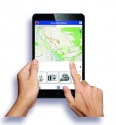SVAN 977A Sound & Vibration Analyser
Home |
About Us |
News |
Promotions |
Discounts |
Services |
Tech Library |
How to order? |
Sitemap |
Contact
Oscilloscopes > 05.07 (208) > SVAN 977A Sound & Vibration Analyser
- Oscilloscopes
- Multimeters
- Signal Generators
- Spectrum Analyzers
- Universal Frequency Counters
- Power Supplies
- Electronic Loads
- Logic Analyzers
- Data Acquisition Modules
- LCR Analysis & Power Analyzers
- Power Quality Analyzers
- Electrical Installations Testers
- Earth Resistance Ground Testers
- Current Clamp Meters
- Microhmmeters
- Transformers Test
- Hipot High Voltage Testers
- Cable Fault Locators
- Circuit Breaker Analyzers
- Protection Relay Test Systems
- Battery Testers
- Solar Photovoltaic Analyzers
- Cable Network Test
- OTDR & Optical Fiber Test
- Optical Fiber Fusion Splicers
- Wireless Network Analyzers
- RF Powermeters
- TV & Satellite Analyzers
- Video Generators
- Broadcast & TV Distribution
- Antennas
- Signal Amplifiers
- Electromagnetic Field Testers
- Electrostatic Discharge Testers
- EMC & EMI Test
- Anechoic Chambers
- Multifunction Calibrators
- Temperature Calibrators
- Pressure Calibrators
- Electrical Energy Calibration
- LCR Calibration
- Infrared Thermal Cameras
- Environment Testers
- Sound & Vibration Testers
- Gas Analyzers
- Water Leak detectors
- Soldering Rework Stations Tools
- Precision Balances
- Topographic Measurements
- Biomedical Equipments
- Microscopes
- Spectrometers
- Video Inspection Borescopes
- Ultrasound Inspection Systems
- Technical Training Systems
Home |
About Us |
News |
Promotions |
Discounts |
Services |
Tech Library |
Terms and Conditions |
How to order? |
Useful links |
Sitemap |
Contact |
Politica Cookie




Copyright © 2010 - 2025 / Distek




Copyright © 2010 - 2025 / Distek

 ROM
ROM ENG
ENG



